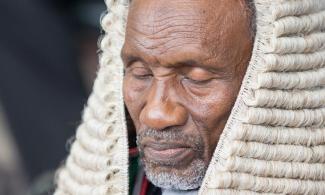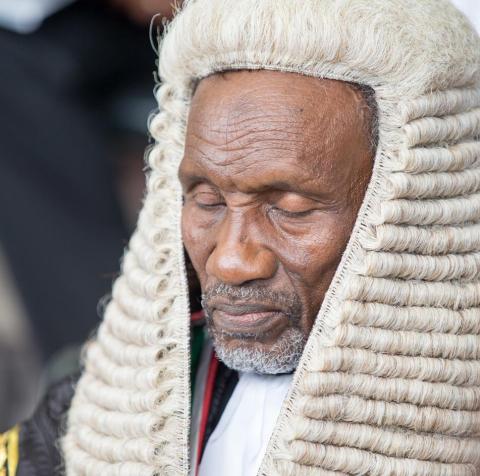
Chief Justice Mahmud Mohammed has described the recent sting operations carried out by agents of the Department of State Security (DSS) against allegedly corrupt judges as an assault on the Nigerian judiciary.
In a statement released today, Justice Mohammed, who also serves as the chairman of the National Judicial Council (NJC), said he was “deeply concerned by the rising antagonism over the recent arrest of our judicial officers.”
He argued that the raid by DSS operations on October 7 and 8 “was certainly an assault on the independence of the Nigerian Judiciary.” Even so, he pledged the judiciary’s full support for President Muhammadu Buhari’s anti-corruption drive. “The Nigerian Judiciary has never and will never shield any judicial officer who is found to be guilty of corruption. However, the CJN urged that due process must be followed.
Justice Mohammed’s statement came amid growing focus on judicial corruption following arrests of several judges, including two serving Supreme Court justices. He faulted President of the Nigerian Bar, A. B. Mahmoud, who recently demanded the suspension of judicial officers whose residences were invaded and who were subsequently arrested. Justice Mohammed dismissed the call as “unnecessary and hasty,” adding that the DSS was still investigating the affected judicial officers.
“Furthermore, the DSS is yet to forward any complaint or any official communication regarding the seven judicial officers to the National Judicial Council,” said the CJN. He added that the NJC had investigated some of the affected judicial officers, finding some of them culpable and recommending their dismissal or retirement to the country’s president or governors “as provided under the Constitution.” He added that some were still under investigation by the NJC, disclosing no complaints had been filed against some of them.
Justice Mohammed urged Nigerians to “continue to have faith and full confidence in the Nigerian Judiciary.”
The CJN reiterated that the current misunderstanding was only between the NJC, a body established by the Constitution, and the DSS in the Presidency. He emphasized that the “Judiciary continues to maintain cordial relations with the other arms of government, that is, the Executive and the National Assembly. He explained that the Nigerian judiciary, as an arm of the Government of the Federal Republic of Nigeria, was not a party in the matter, adding that the Nigerian judiciary was not on trial.
According to Justice Mohammed, the NJC was currently investigating various complaints against some judicial officers. He promised to make appropriate recommendations to the president or governors, adding that those implicated could then be charged for “the offenses disclosed from the facts against them and be prosecuted if necessary.”

The statement, issued on the CJN’s behalf by H.S. Sa’eed, declared that the “Nigerian judiciary continues to function and our Courts remain open to all who seek remedy.”